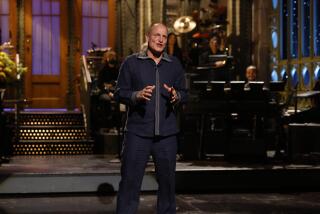Actor May Post Bail for Marijuana Activist
- Share via
Attorneys for Todd McCormick, the medical marijuana activist facing up to 10 years in federal prison for growing thousands of marijuana plants in a rented Bel-Air mansion, were struggling Thursday to set up an international video conference that might free him on a half-million-dollars bail.
A spokesman for actor Woody Harrelson, a proponent of the commercial use of hemp, said Harrelson would send a $500,000 check to the U.S. attorney’s office to obtain McCormick’s release after eight days in custody.
But authorities said later Thursday that they wanted assurance that Harrelson--now filming a movie in Australia--understood his obligations. A video conference was planned for late Thursday night, but officials said it might be delayed for a day or more.
McCormick, 27, who was arrested last week after authorities found 4,000 marijuana plants with an ultimate commercial value of $20 million, has smoked marijuana since he was a teenager to lessen the pain of bone marrow cancer.
*
Medical marijuana activists were infuriated by his arrest, saying that he should be protected by California’s Proposition 215, which legalized the cultivation of marijuana for medical purposes.
Federal authorities said a person posting bail is required to sign an affidavit in the presence of a federal prosecutor stating he or she understands that the bond will be forfeited if the defendant fails to appear in court as scheduled. With that option gone, they turned to a video conference.
Said Harrelson’s publicist, Simon Halls: “Woody does not advocate legalization of marijuana for recreational use, but he is absolutely an advocate for medical use.”
Halls said Harrelson understood McCormick to be growing marijuana for medical use, a practice legalized in California in November with the passage of Proposition 215.
“He doesn’t understand why Todd is being treated like a criminal,” Halls said.
McCormick, who had been renting the Bel-Air mansion with book-advance money from a publisher, was arrested by sheriff’s deputies who said he was not only growing marijuana for himself, but selling it to people in other states.
*
Proposition 215 decriminalized possession and cultivation of marijuana for those whose doctors approve its use. But the measure does not protect the sale of marijuana, even for medical use. McCormick’s lawyers say prosecutors have provided no evidence that McCormick was selling marijuana.
Thom Mrozek, a spokesman for the U.S. attorney’s office, would not comment on Harrelson’s involvement in posting bail and could not confirm receipt of a Harrelson check. He said the conditions of McCormick’s bail require prosecutors to determine that the bond posted did not derive from illegal sources.
Harrelson, a partner in a California company that makes clothes and other products from imported hemp, challenged Kentucky law last year by planting four hemp seeds, which led to his being charged with misdemeanor possession of marijuana.
Mrozek said the Proposition 215 defense would be moot in McCormick’s case because he is accused of violating federal laws. But friends hope McCormick will prevail.
“I just am dubious they’ll be able to get 12 people in an L.A. jury to send someone who’s had cancer 10 times to the penitentiary for 10 years,” said Richard Cowan, a friend of McCormick’s and editor of the online publication Medical Marijuana Magazine.
*
McCormick’s attorney Bruce Margolin said Thursday that he may waive a preliminary hearing to have more time to persuade prosecutors not to indict McCormick in federal court.
He said McCormick was acting in good faith under Proposition 215. “To deny him that defense by taking him to federal court denies him his due process and would be unjust because he was acting in good faith.”
When sheriff’s deputies announced that McCormick would be federally prosecuted, they cited their belief that he had engaged in interstate sales.
McCormick’s bail was originally set at $100,000, but was raised late last week at the request of prosecutors who thought the magnitude of the crime warranted it, Mrozek said.
More to Read
Sign up for Essential California
The most important California stories and recommendations in your inbox every morning.
You may occasionally receive promotional content from the Los Angeles Times.










